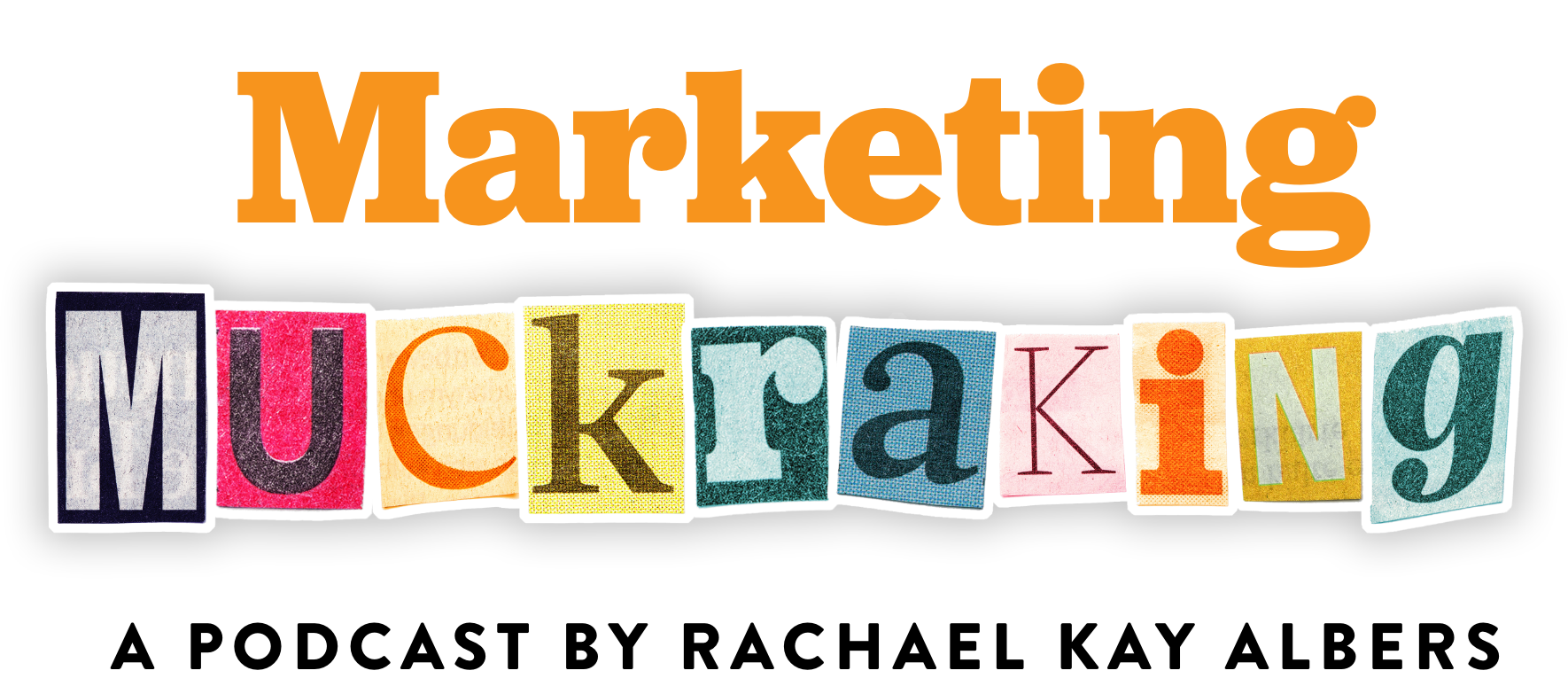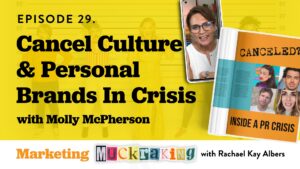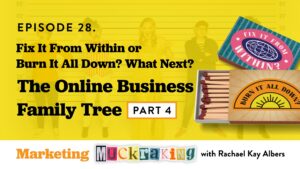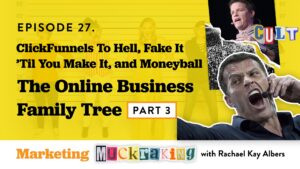Welcome to Part 2 of this four-part series on The Online Business Family Tree, where we trace back how we arrived at this moment in internet marketing and online business and who are the key leaders who brought us here.
In this installment, we’re diving into six figure masterminds, Marie Forleo’s B-School, the Cult of the Syndicate, and how early Internet marketers like Mark Joyner, Dan Kennedy, Yanik Silver, and Russell Brunson brought mind control and manipulation online.
If you don’t know — or care — about these names, never fear. We focus on what tactics these leaders popularized and how they’ve invaded nearly every celebrity online business course, including Matthew McConaughey’s.
Remember, this stuff didn’t start on the Internet — it goes back hundreds of years. To understand marketing history is to understand ourselves and our culture — marketing is the fuel for the engine of capitalism. Let’s take a trip through time, so you can be a more informed consumer and, hopefully, a more ethical marketer.
What you can expect in Part 2 of the Online Business Family Tree:
- How 6 figure masterminds became a thing (someone please tell me why anyone would pay Amanda Frances $100K to "sit in her energy"?!)
- The rise of joint venture partnerships and affiliate marketing
- Why Marie Forleo's B-School is the bee in my bonnet
- The concerning trend of "business" coaches who are really just teaching the marketing of the self and personal branding through proximity to power
- How celebrity personal brands manipulate refund rates and quash negative reviews through stick strategies and boilerplate non-disparagement clauses
- The boy bosses responsible for bringing junk mail into your inbox
- Where clickbait came from (spoiler alert: Bat Boy!)
- Why easy "ethical marketing" swaps are just more of the same
- The nuance of shame-based or pain point marketing (and my unpopular opinion on speaking to pain — it might surprise you!)
About Lisa Robbin Young
Lisa Robbin Young has 30 years of business experience as a coach and creative entrepreneur: she is an award-winning speaker, best-selling author, and accomplished musician with multiple albums to her credit. You may even recognize her from the Disney+ show “Encore.” She is also the host of the “Creative Freedom” show — I highly recommend her music video parodies. Check out “There are worse things I could do” for a Marie Forleo crossover with Awkward Marketing. She specializes in helping creative entrepreneurs build a business that works for how you’re wired to work.
An annotated guide to the online business family members we discuss in Part 2:
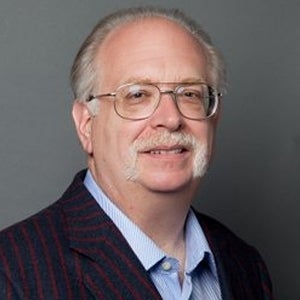
Dan Kennedy
Dan Kennedy, infamous for his work in direct mail marketing (i.e. junk mail), led one of the first internet marketing copywriter mastermind groups with Bill Glazer, the Glazer-Kennedy Insider's Circle. He mentored Russell Brunson, who eventually bought the Glazer-Kennedy Insider's Circle and leveraged Kennedy's audience and teachings to expand ClickFunnels, or DickFunnels as we call it around here.
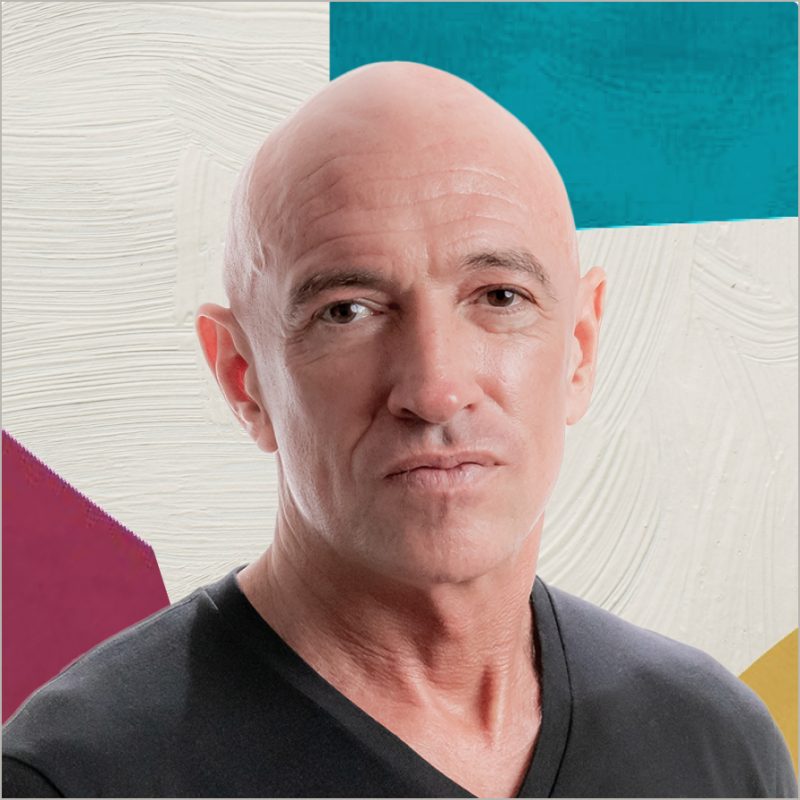
Mark Joyner
Mark Joyner, known to some as the "godfather of digital marketing," leveraged his military background to write and teach Mind Control Marketing and Simpleology, all about how to play with people's heads for a payout. He taught Russell Brunson how to build a cult of personality and call it "business." Joyner's website now touts his "8% bodyfat." Ok?
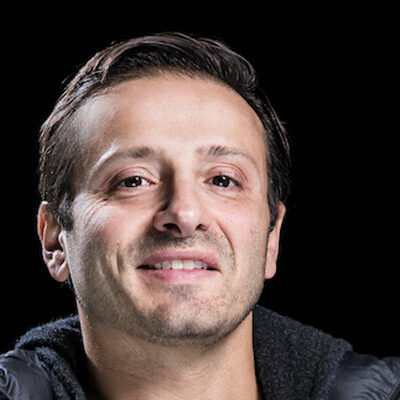
Yanik Silver
Yanik Silver worked with Dan Kennedy to help bring predatory copywriting techniques online. He is often found in search results alongside "get rich quick schemes." Today, he sells "cosmic" oracle cards.

Frank Kern
Frank Kern, whose claims to fame include being sued by the FTC for false and misleading business practices, was an original member of "The Syndicate" internet marketing cult. He's been known to cosplay as a laid back surfer, but today he's wearing a lot of suits again, so you tell me.
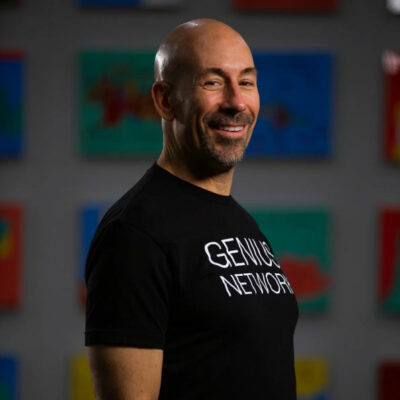
Joe Polish
Joe Polish is one of those guys who refers to himself as a genius. (And he's got a "Genius Network" $25K+ mastermind group of his own, in case that's in doubt.) He's also the president of Piranha Marketing Inc, if the name gives you any sense of his personality. He was a member of The Syndicate.
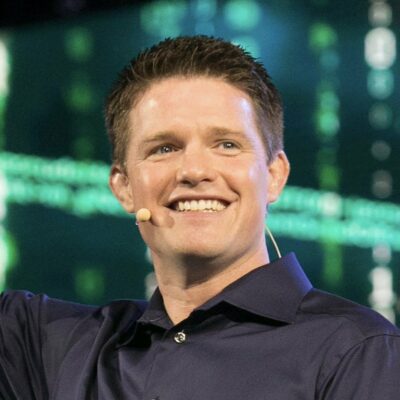
Russell Brunson
Russell Brunson developed ClickFunnels, a software designed to ruin your life and make him rich. Brunson studied mind control and junk mail from Mark Joyner and Dan Kennedy to build his business and now teaches people how to build cults for cash. Notably, he wrote a book where he cites Hitler as one of his business mentors.
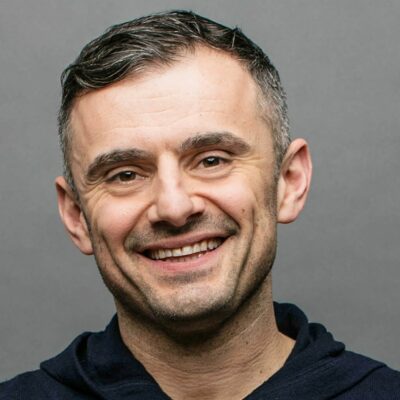
Gary Vaynerchuk
Gary V is perpetually yelling at the Internet. He got famous selling wine on YouTube and then parlayed that into a social media advertising agency, VaynerMedia. Today, Gary mostly shouts at his phone about the importance of being kind. And he's happy to report, he traded in his wife for an Instagram model. The pair publicly debuted their relationship at Cannes, where they wore "mental health mantras" on their runway looks. (Mantras included "nice always wins" and "femininity is power." K.)
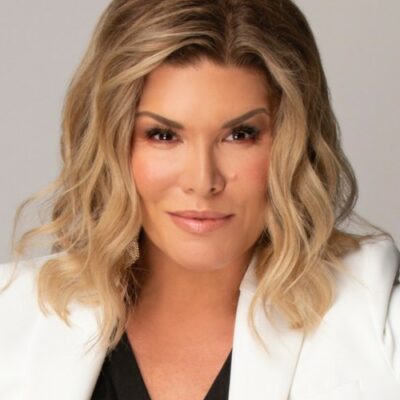
Ali Brown
Ali Brown calls herself "the world's most recognized business coach," but I'll let you be the judge of that. She mentored Marie Forleo and led one of the first 6 figure masterminds. Her joint venture partnership with Lisa Sasevich, "Simply Irresistible!" was an early example of celebs leveraging someone else's brains to sell their own perceived expertise. She was also a member of the Glazer-Kennedy Insider's Circle.
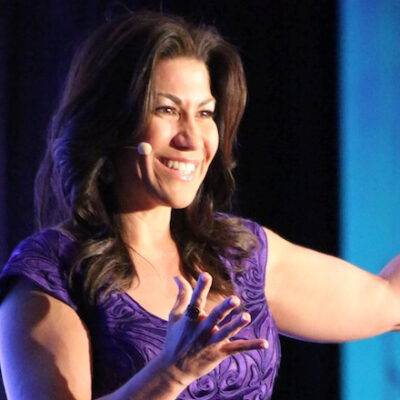
Lisa Sasevich
Lisa Sasevich, sometimes called the "Queen of Sales Conversion," skyrocketed to Internet fame when she JV partnered with Ali Brown to produce "Simply Irresistible!" She brought the content, Brown brought the list.
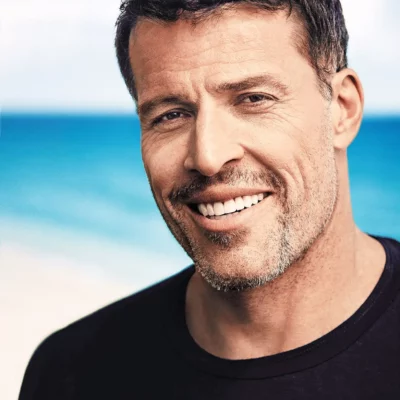
Tony Robbins
Tony Robbins, who I like to call "Tiny Tony," is one of the world's top grifters. Largely influenced by Think and Grow Rich, he peddles his business and hypnosis-based manipulation to anyone who will throw money at him. His business model is based on cross-pollinating his audience with famous folks whose followers have never heard of him before. Big fan of victim blaming and denying sexual assault allegations. All roads lead back to Tony Robbins.
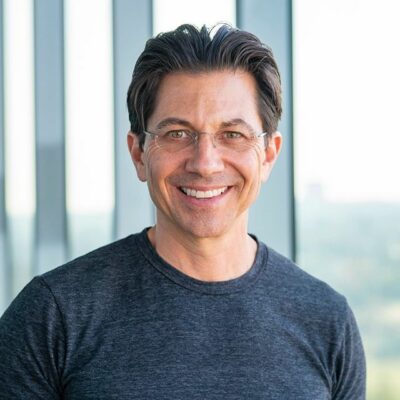
Dean Graziosi
Dean Graziosi, known to some as "Creepy Uncle Dean" ("some" is me) was sued by the FTC for defrauding real estate investors out of $400 million. (This was his next move after graduating from being a used car salesman.) But Graziosi is no "one hit wonder": he's under FTC investigation as we speak! Today, Graziosi spends his time following Tony Robbins around and convincing Jenna Kutcher he's qualified to be anybody's mentor.

Marie Forleo
Marie Forleo is a business coach who built her B-School empire by playing moneyball, riding coattails, and tucking non-disparagement clauses into her terms & conditions. She has a history of silencing members of her community when they speak up about racism and misogyny in America. Loves Tony Robbins. Hates the truth.
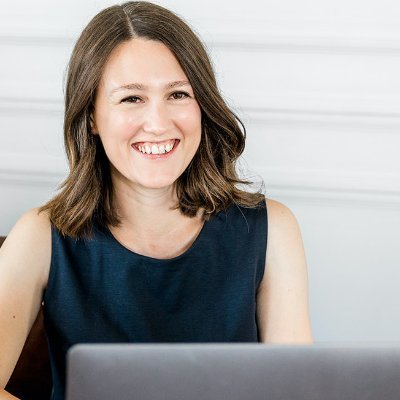
Laura Roeder
Laura Roeder partnered with Marie Forleo on the early B-School prototype, "Rich, Happy, and Hot," a mastermind where Roeder brought the tech savvy and Forleo brought the grille and chains (yes, Forleo once had a picture of herself on her website outfitted as a rapper, calling herself a "gangster of love.") Today, Roeder runs Paperbell, a coaching software company.
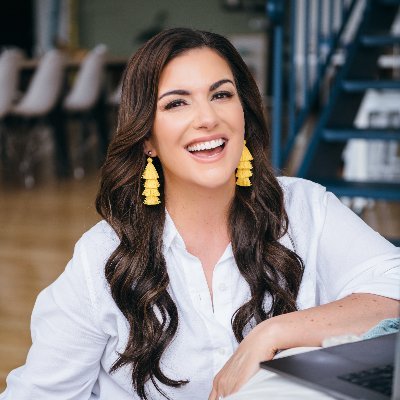
Amy Porterfield
Amy Porterfield is the voice of "Online Marketing Made Easy," a popular business podcast that makes her easy money and everyone else? I'm not sure. Before launching her own business as a "Facebook expert," Porterfield worked for Tony Robbins, and then joined Marie Forleo's mastermind, where she rubbed elbows with future affiliate partners. She was once featured on Good Morning America as Rachel Hollis and Jenna Kutcher's BFF, but dropped Hollis like a hot potato when Toiletgate made her SEO-optimized friendship with Rachel bad for business.

Hillary Rushford
Hillary Rushford, a stylist and lifestyle influencer, once built an entire business model around affiliating for Marie Forleo's B-School. Today, Rushford finally has some courses of her very own teaching women to be beautiful.
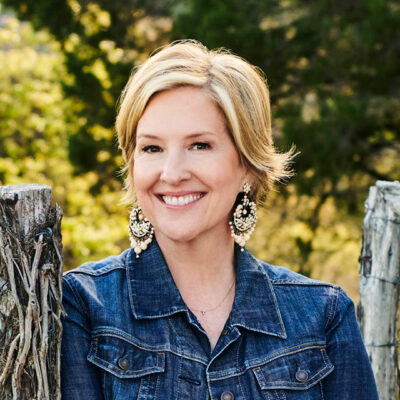
Brené Brown
Brené Brown is who every aspiring life coach wants to be when they grow up. (Just ask the bazillion people who tell me they want to build a brand like hers.) Brown is an academic, researcher, and author. And unlike many names on this list, Brown seems to have a comprehensive and compassionate understanding of her subject matter. Hopefully, she'll see this post and stop taking these peoples' calls.
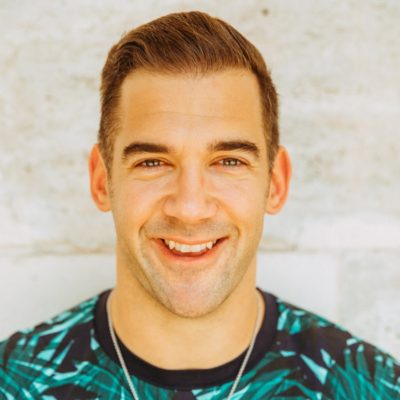
Lewis Howes
Lewis Howes, the man famous for sleeping on his sister's couch before thinking and growing rich, started as a LinkedIn sports marketer and today, is an expert on everything. Just ask him! Howes doesn't do hows any more; he is the poster boy boss for trading in the substantive parts of his offers for meandering thoughts on "greatness." What an upgrade!
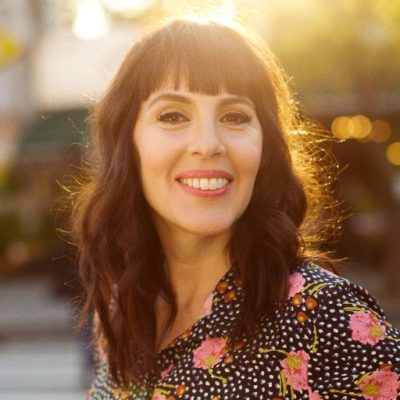
Laura Belgray
Laura Belgray loves to talk about how she used to hate Marie Forleo, until she realized that the Queen Bee of B-School could be useful to her! Belgray joined Forleo's mastermind and, for years, was the brains behind the "gangster of love's" most hilarious Marie TV moments. I've seen her work and she's brilliant on her feet, which begs the question, "Why aren't you smart enough to stop endorsing the world's greatest grifters?"

Richard Branson
Richard Branson is a hologram of a rich guy who looks great in a "Look, ma! I'm on an island!" selfie (available for weddings and birthday parties). When not launching dick rockets into space to prove to Jeff Bezos and Elon Musk that he's still got it, Branson tolerates dickfunnels running around his private island, pretending they're friends with him. If you're young and blond, he'll even let you kiteboard on his back!
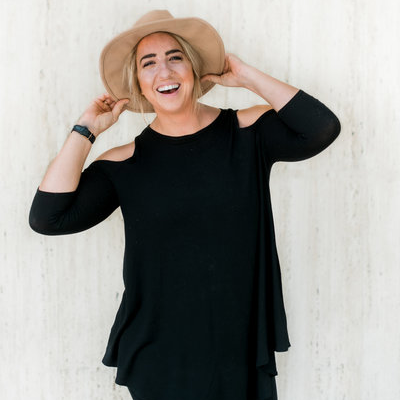
Jenna Kutcher
Jenna Kutcher is mad at me. (Don't believe me? I own the domain! JennaKutcherIsMadAtMe.com!) Kutcher once bought a camera on Craigslist and voila! She inadvertently released Dean Graziosi into her life like a genie from a bottle. Kutcher asks hard-hitting questions like, "How are you, really?" but is too busy monetizing her kids to hear your answer. And oh! Didya hear? She's a health coach now! As of 2023, giving up mac 'n' cheese and installing a sauna in your bazillion dollar home qualifies you to advise Internet strangers on their wellness! Comment HEALTH and she'll DM you.
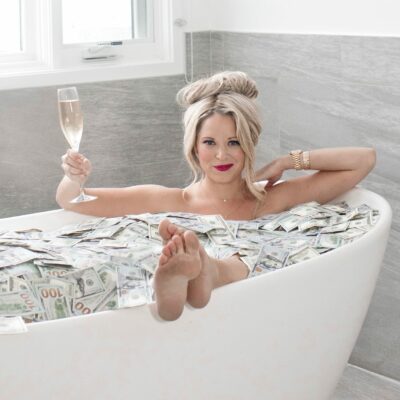
Amanda Frances
Amanda Frances, author of Rich As F*ck, once compared herself to Mother Teresa, so you know she's a humble queen. Mostly recently, Frances got a bad edit on "Selling Sunset" and is still pissed about it. She can typically be found swimming in pools full of cash and shaming people into giving her six figures in exchange for the opportunity to "sit in her energy." Frances is so generous, she has not adjusted the rate for inflation.
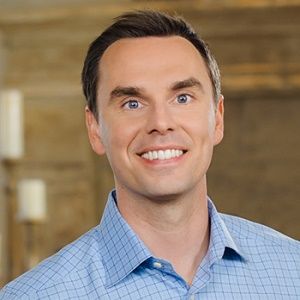
Brendon Burchard
Brendon Burchard is the "world's #1 high performance coach" but I have it on good authority that he's actually #1 at being an expert scammer. Burchard is currently running ads designed to shame you into working harder at coffee shops. Loves Tony Robbins, long walks on the beach, and having staring contests with himself in the mirror. (Fun fact: he hasn't blinked once in 46 years!)
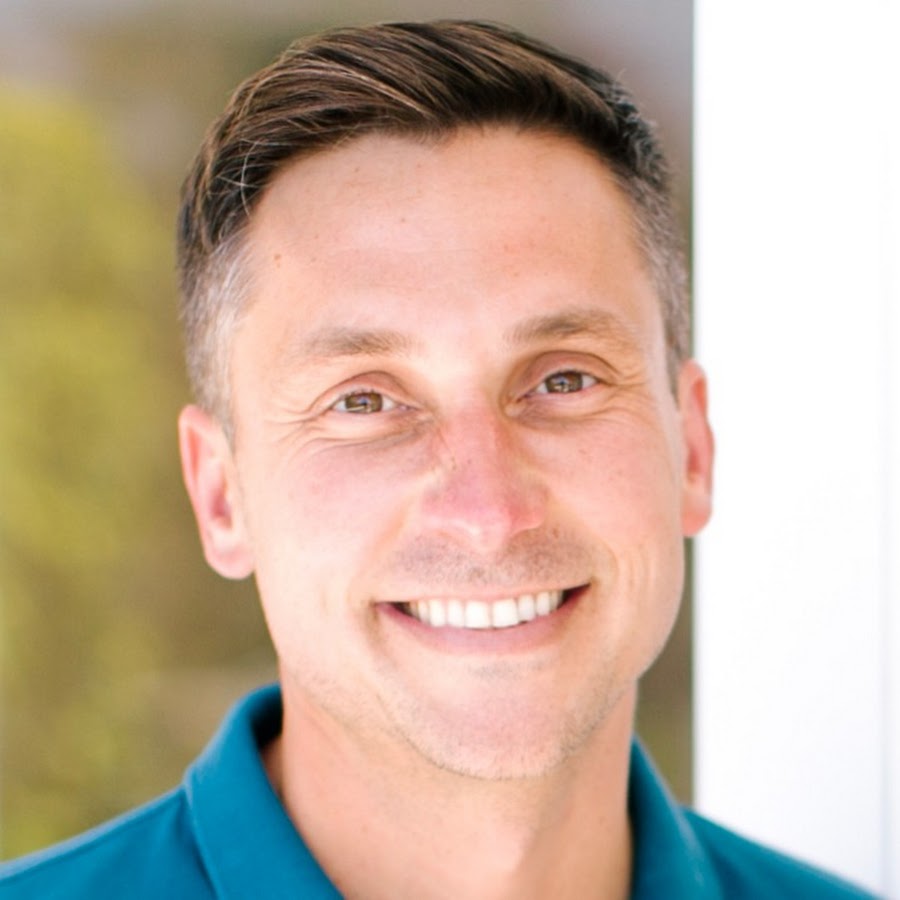
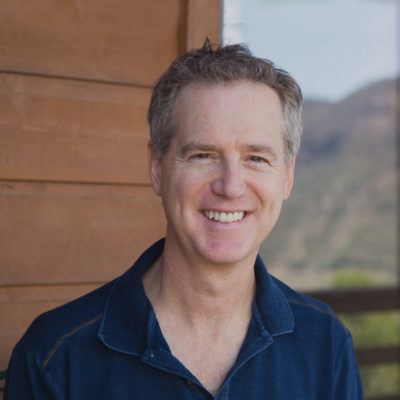
Jeff Walker
Jeff Walker is known for his "Product Launch Formula," a step-by-step guide to exhausting people into giving you their money and regretting it immediately. (Not to be confused with Jerry Jeff Walker, "Cosmic Cowboy.")
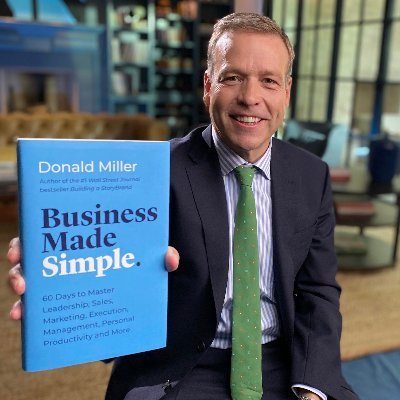
Donald Miller
Donald Miller, of StoryBrand fame, mostly would like you to forget that before he wrote Blue Like Jazz, he cosigned and helped promote purity culture poster boy Josh Harris. When Harris publicly deconstructed after covering up sexual abuse in his mega church, Sovereign Grace, he pivoted to becoming a StoryBrand guide and branding his own redemption arc. Miller gave it two thumbs up. How's that for being the hero of your own story?!

Matthew McConaughey
Matthew McConaughey is a life coach now! He launched his "Roadtrip - Highway to More" program on ClickFunnels, flanked by Tiny Tony Robbins and Uncle Dean Graziosi (they had Marie Forleo take the pic for posterity). For only 4 payments of $150, you can watch McConaughey play the drums and drawl at you about authenticity in front of an oversized stoplight prop that he stole from Hollywood.
Mentioned in this episode:
Episode Transcript
Rachael Kay Albers: So we've gotten our way from the Prosperity Gospel myth of meritocracy, kind of turn of the 20th century ethos and how that led to masterminds, right? And as you said, we've got all of these, captains of industry glamping with the muskrats and their millions and presidents are hanging out with them and then they start to look around at each other and say, “Hmmm. I think we could make some more money off of this.” And so what, what happened next?
Lisa Robbin Young: Well, you know, we talked a little bit about Dan Kennedy and his bringing people together and this is the thing about masterminds, right? The original premise of a mastermind was these were all people who had a vested interest in supporting and working with one another and it wasn't a monetized thing, but then we get the age of the internet marketer and it's, “everything is monetized.” And so, “How do we make money from this?” And so you've got guys like Yanik Silver and Marie Forleo and Joe Polish going off to Necker Island with Richard Branson to hang out for a few days and learn at his feet and, you know, talk about what they're doing and simulate conversations with one another. They're not paying Joe or Yanik or Marie or Richard Branson to be in a facilitated group.
They paid their way to get to the island. They got an invitation from Branson to come. But then they're there and they're talking amongst themselves and cross pollinating these ideas. Great ideas for them. Right. “Oh, let's see. I wanna do something like this for my people. But if I'm going to be the leader of it, then they should pay me to do it. Let's do that.”
And I'm interested in Marie Forleo because she’s one of those people that's been cross pollinated in a lot of different ways. So she studied with Ali Brown for several years before Ali Brown went her way and then Marie stepped away from her and that was when I kind of started to latch onto Marie and what Marie was doing because I was really more in alignment with where she was headed at the time. And she was connected to Yanik Silver because there was this whole east coast group of internet marketers, right?
So, Yanik Silver and Gary V and Marie Forleo and several other people were all on that coast. So they could spend time with each other. They could get to know each other. They could appear on each other's video shows and YouTube channels and, you know, at their events and all of this stuff. And so they start holding their own events for their people to get that high ticket thing. Allie Brown had launched her diamond level mastermind and it was a six figure investment for a year long program.
And I knew a copywriter who had been hired into that program later on once it had been run for a few years and there were several tiers and she was like,”When I came into the program, they told me, well, we've really got to step up our game at Diamond because you're bringing your A game!” and she's like, “What do you expect? I don't understand.” So we're seeing these people trying to monetize this access right at this very high level and it trickles down.
And so there are people who start trying to do masterminds and for some of them, it works well. And for some of them, it doesn't because of what they are or aren't delivering. But that's kind of where it all came from. But the thing that made it work were these JV relationships, right?
Rachael: So that's number three. So we go 1) prosperity gospel to 2) masterminds to 3) JV relationships where the powerful people get in the room with each other. And then they say, “Oh, we could make a lot more money if we support each other's offers.” Right? “We haven't paid to be in the room, but now that we're in the room, how do we leverage this? Let's leverage our relationships with each other. You've got an audience that I don't have, I have an audience that you don't have. What if we support each other's offers? And we both make a cut.”
So one piece of this is turning the free mastermind – turn the unpaid experience of just going with a group of your peers to learn from each other, which isn't inherently bad, right? Like that's a valuable thing to do.
I've been in a lot of peer led masterminds where nobody's paying to be there. We all bring something else to the table and we're learning from each other, right? That's how it begins. Then they get in the room together because here's what happens. Like you said – the press was there in the later iterations of Henry Ford, glamping in the woods with presidents and muskrats, right? The press comes in there looking at it and now the world is looking and saying, “Oh, I wish I could be in the room where it happens or the tent where it happens, right?”
So then there's an opportunity to create a paid experience where you're paying for access. That's one thing. But then what that becomes and turns into is “How can we, who are in the room where it happens, make money off of our relationships with each other?” And that's where JV partners come from. I just want to make sure I'm getting the sequence down before you start dropping all the juicy nuggets.
Lisa: Yeah. So one of the lesser known, but more pivotal JV relationship communities – that's a loose term I'm gonna use – was actually called The Syndicate. And this is something that doesn't get talked about a whole lot: a group of folks that included Frank Kern and I, I'm pretty sure Yanik Silver was in it for a little while. That level of seven and eight figure mastermind marketer people, all in a group and they would set their marketing calendars and they would coordinate with one another.” Well, you're promoting in June. So I won't promote till July. Well, you're promoting in July. So then I'll, I'll promote the first couple of weeks of August…” so that they always were pitching somebody else's stuff to their list every month. They had something. And so that's where these JV leader boards came from and the standard was 50% right?
“Because I'm a multimillionaire. I'm not doing this for a $10 commission. I want half because I've got 100,000 people on my list,” or in the case of Mark Joyner, “I've got a million people on my list and I'm not gonna just market to get $10 bucks a head. I want half.” And that's when people started jacking the prices of their programs to $5000 because they had to give half of that back to their super affiliates or JV partners who were cross pollinating to their lists.
And that became the industry standard of, well, it's a 50% commission. And so when 10 years ago, I had this wave of new entrepreneurs coming into the online space, they were like, “Why should I give up half of my money?” I'm like, “You really shouldn't. But that's what the industry has said is the standard. So you either have to double the price or you have to tell people you're only gonna pay 10% and you're not gonna get as many people in the door.”
And that's a choice you have to decide on as a person who wants to run an affiliate program. One of the reasons why I stopped doing affiliate programs for a very long time. I might change my mind. But right now I'm not doing it because I didn't like the idea of inflating the price, inflating the value just so that somebody else would think I was worthy of their time to promote. You either like my stuff or you don't like it. If you don't, then don't. This isn't about the dollar bills. It's about helping the right people get the results that they need so that they can go have enoughness, live their lives, run their businesses, and make a better impact in the world.
Rachael: And this is why it's so hard to truly map out a family tree because it's not as easy as saying, Tony Robbins begat Jenna Kutcher who begat whatever, right? It's all overlapping circles of the world's most fucked up Venn diagram. Because we've gone from prosperity gospel to masterminds to JV, also known as joint venture partnerships, right? When we're using this internet shorthand, I forget that there might be people like “JV, what's that?”
People don’t talk about JV partnerships as much these days as they did when I got into the game in 2008, 2009. But JV refers to joint venture partnerships and then joint venture partnerships leads to affiliate programs. Can you help discern what's the difference between a JV partnership and an affiliate program?
Lisa: So today, there's less of a difference between the two. Back in the early wild west days of the interwebs, you would go to these people in your mastermind and you would do a joint venture partnership with them saying, “Hey, you're basically gonna be a super affiliate. I'm gonna lean on you to bring your list to my offer and I'm gonna give you half.
And what happened was people who had purchased these programs, people who were invested in getting success from these programs, they saw these other people making all this money going, “I'd like to get a piece of that. I mean, I can actually speak to what's good about this program. And I would like to get a cut,” and they're like, “Oh, that's a great way to bring in more revenue, but I'm not paying you 50%. I'll give you 20% or 25% or 10%. Right?” And so then they had your super affiliates who are often your JVs and sometimes a JV was actually two people collaborating on a project together.
One of the examples that I like to use is Lisa Sasevich, who was known for years as the queen of sales conversion because she came out of a relationship coaching organization and she was their master salesperson and she could sell water to fish – she was just that good.
And Ali Brown met her at one of those coaching events and said, “You're really good. I would love to do something with you. My list could really use your sales knowledge.” And so she created the content, Ali brought the list, and they created this program called “Simply Irresistible” together. And, you know, for years, everybody thought Ali did this, created this big thing and it was so fabulous, but Lisa was the one who created the content.
Ali had already developed this list. And so they worked, they partnered together and then split the proceeds of whatever they had created together. That was the original intention of a JV but it really ended up becoming super affiliate, right?
Rachael: So the intention of a JV is two or more business leaders come together to create a program using both of their knowledge, right? It's supposed to be about “I'm bringing a little bit of my stuff…”
Lisa: Now in Lisa and Ali Brown's case, it was Lisa bringing the knowledge and Ali bringing the marketing and the brand and the audience because Lisa was a brand new internet marketer at this point just starting to build her list because Ali had told her, “Hey, there's this great world called internet marketing where you can make a lot of money and not have to have this day job anymore.”
Rachael: Right? Isn't that the dream that everyone's being sold?
Lisa: And Lisa is like, “Tell me more,” and Ali's like, “Well, I've got a list of people and we do these monthly calls and I would love for you to come talk about it and see if it goes well. And then we can do a program together.” And you know, the program was like $1500 or $800 dollars – somewhere in that ballpark. So that's good money when you're splitting at 50/50 and you've got 12,000 or 10,000 or 5,000 people signing up for it.
Rachael: OK. So here's another difference between the JV model and the affiliate model, which is with the JV model, no matter who's bringing in the lead, you're still splitting the revenue.
Lisa: Right. In a true joint venture, there weren't other affiliates funneling sales in. It was just the two of them working together to promote it. The second time it would launch, then you'd have your super affiliates and your affiliates and it's priced at $750 – half of that goes to your super affiliate partners and then you split the other half that was left. And, so again, you get people who have been in the program going, “I'd like to get a piece of that,” and, “Well, ok, let's figure out how to do this.” And that's where affiliate software started becoming a thing because before that, it was all tracked manually because you only had five or 10 people promoting it. Well, now you've got an army of clients who want to promote this. “We need a way to manage this.” So, you know, One Shopping Cart and Infusion Soft and all those guys come into the game and this is how the JV turned affiliate model really echoes and is similar to the pyramid scheme MLM network marketing model.
Rachael: Like they're all splitting it and that's it. The affiliate model is: “Now we've got this growing audience of people who want a little piece of what we have, who are recommending us to their friends. How do we further incentivize them to continue recommending us to their friends? We're gonna give them a little cut.”
Lisa Well, “We're gonna give them a little cut and we're gonna put them in the running with all of the big names on the leaderboard to incentivize them to sell more seats in our program so that they too could have the shot at winning the car,” which they hardly ever do have a shot at winning the car because they don't have $100,000 or 100,000 name list, right?
And so then you get that grumbling. “There's no way we can compete with those guys.” And that's when you start to see people like Marie Forelo back off on affiliate marketing and say, “Well, I'm only gonna have select people promote the program from here on out.”
Canva is doing a big change right now, too. They're like, “We're only gonna allow influencers with X number of audience who actually do Canva specific content be affiliates.”
And I'm like, that's a shame because I'm a coach and we use a lot of Canva and I refer a lot of people to Canva and now I'm not going to be able to do that for the kickback that I would get right now. I have to do it because I either believe in the program or I don't. And I believe in it. That's the whole reason I recommend it in the first place, but it's nice to have a little bit of coffee money sometimes. And now they're saying “No, we're only going for the big fish.”
Rachael: And not only that, I think you were showing me some of Canva’s adjusted affiliate guidelines in order to qualify to affiliate for Canva now. Not only do you have to self identify as an influencer or content creator, but you have to be producing like a minimum of X amount of post posts or, or pieces of content about Canva per month. So now they're gonna say “No, you can't just organically mention this in your programs or to the clients that it would be useful for. We need you doing the unpaid labor of doing our marketing for us.”
Because that's the other piece of the affiliate model that makes the folks at the top of the funnel – the top of the pyramid – rich is that instead of me warming up a brand new person, a brand new lead from scratch, I'm gonna piggyback on you and your existing trust with your audience. And instead of spending a bunch of money on ads and a bunch of time and energy warming up a cold lead, you've already warmed up that lead, they already trust you. So if you say, “Hey, you should do Marie Forleo's B-School.” Well, then I just saved a ton of money and also potentially a ton of turnover, warming you up from scratch. I don't have to pay for those ads. I just advertised through somebody that already has a list of people that trust them. Bing bang boom. And that's part of why they split it 50/50 because it’s cheaper to split it 50/50 than it is to pay for ads or to nurture a coal lead from scratch. It's longer to do that. It's more expensive to do that. “I'd rather just split the cut with Jenna Kutcher or Laura Belgray or whoever the hell else is affiliating for me…”
Lisa: Well, and there was a time when Marie really stood on with pride, the fact that she wasn't running ads like, “I don't need to run ads. Our affiliate program is great. We don't need to.” And then there was a tipping point because her affiliate started running ads so that they could get in front of more people so that they could get some money from the work that they were doing.
And then she was like, “Ok, well, here's some approved ad copy and here's some approved ad content. Here are some approved ad images that you can use,” and people started using it. So she wasn't running ads and she wasn't paying for it. But her people were, her affiliates were running the ads for her.
Rachael: What an evil genius, terribly effective, terrible approach.
Lisa: Right, terribly effective approach. I wish I could have other people pay for my ads. Wouldn't that be fabulous?
Rachael: There's so many elements here because one, it is the cross pollination of audiences, the “I am going to get in front of a brand new audience that doesn't know me yet. And I'm gonna piggyback onto the relationship that you have with them.” There's that piece. There's also the piece that we called out earlier, which is within this model, it requires the person selling the course of the program, whatever to massively inflate the price so they can afford to give 50% or even 25 or 30%. And like you said, what makes this so ineffective for the people they're teaching it to is – if I am just an itty bitty micro, small business owner and I've got program of my own to sell and I don't have a list of hundreds of thousands and I don't have famous affiliates who are going to hammer their audiences for the next three weeks about why they should buy it…I can't actually afford to give away 50% of the revenue that I'm getting from this program.
And yet the industry pressure is that, that's what you do. And so I see folks trying to emulate that B-School model or fill in the blank, right? Because so many programs – you've got the Digital Course Academy (DCA) has its own affiliate model. You've got Impacting Millions has its own affiliate program – or did at one time. They may not be currently doing it that way.
But then they launch their courses, right? And then they're trying to – they go to their friends and say, “Hey, will you affiliate for me?” And they're splitting it 50/50 but they can't actually afford to do it. They don't get the volume that they need for it to actually be profitable for them. And then there we go again with them feeling like, “Oh, it must be that my program is crap. It must be that I'm bad at what I do. It must be that…” No, it's that this model only works if one, you've got a massive audience already and you already have the know / like / trust factor. Two, you're connected to influential, powerful people that also have that level of scale, right? And then on and on we go. So we've got the JV partnerships and correct me if I'm wrong. But when it comes back to B-School, wasn’t B-School originally a JV partnership?
Lisa: Well, yeah, this is a tricky wicket, right? The very origin of B-Shool started with Marie Forleo’s Adventure Mastermind, right? There were elements of Marie's mastermind modules that she had taken from that and she was like, “I don't want to do a year long thing. I wanna do something that's a little more quick and dirty,” right?
Something that's easier.
Rachael: Emphasis, dirty.
Lisa: Right. Well, she had done some live events and, you know, she had met up with Laura..
Rachael: Laura Roeder.
Lisa: Laura Roeder, right. So she hooked up with Laura Roeder who was great with the tech piece and she's like, “I want to create this online course program kind of thing with some live pieces. But, you know, a lot of training.”
And so that's where Rich, Happy, and Hot B-School came from. The content, the bulk of the content had originally come from her adventure mastermind and then she parlayed it into this six week program with Laura. Laura, at some point was like, “I would really like to do Meet Edgar and go my own separate way.” And so Marie bought her out and then it was her own program. But when the two of them were in it together, Laura did the tech. Laura did some of the business strategy stuff, but the bulk of that kind of stuff really came from Marie. But like “how to build a website” and what to put on your website and all that stuff? That was all Laura. So it was a partnership and Laura got to the point where she's like, “I'm ready to be done” and Marie is like, “Ok – and now we're gonna drop the Rich, Happy, and Hot part of the branding.” Because I want to elevate my appearance as someone who is more elegant, more refined. I'm not that “gangster of love” as she used to call herself, you know, back in the day, right?
Rachael: For anybody that doesn't remember there used to be a picture at the bottom of Marie Forleo’s website where she had a grille and chains. OK? And I feel like it's just important to remember the gangster phase of Forleo that she would love for us to forget.
Lisa: Well, and I think this is an important lesson for everybody that we all evolve, right? And we can choose to evolve for better or for worse as the case may be. And so when you look at where she used to be to where she is now, she's made choices to shift her brand in a different direction from where that was. And we all have the ability to do that.
That's why I love your post about, “You Don’t Want Marie Forleo’s Website” because you don't. You want something that really represents who you are. And so she's made this choice to go in this other direction and this new direction is how she ends up on the radar of Tony Robbins and Frank Kern and all of The New Money Masters and that whole thing which then paves the way to Matthew McConaughey and like there's this long rich tapestry of all roads leading back to Tony Robbins.
And that's why it's so incestuous. Right? Like Frank was sending spam emails and he made a killing sending spam emails at a time when it wasn't illegal, but it was really annoying. And then he went to a Tony Robbins event and Tony Robbins was really impressed with him and he was like, “Hey, you really need to get on this internet marketing thing.”
And Tony's like, “I don't know what you're talking about” and then the whole New Money Masters thing came out and, “Oh, you should interview, not just me but Marie Forleo and some of these other people who are making a killing online,” and “Oh, how can I get involved with this?” and so that whole world blows up and that's why we recently saw this whole Matthew McConaughey thing happen because Matthew had previously been a student of Tony's and traveled in that celebrity world that Tony travels in from time to time. And this is speculation on my part. I'm sure he turned to Tony and said, “How do we blow this thing up? Because this is the thing I really want to do.” And Tony tapped his JV network and said, “Hey, guys, would you like to have Matthew McConaughey on your show because he's doing this thing?” And they were like, “Where do I sign? It's a real bona fide celebrity. Of course, I want him on my show.”
Rachael: And for those of you who aren't aware what we're talking about is the fact that Matthew McConaughey recently launched his own life coaching program school.It is called Highway to More: Road Trip with Matthew McConaughey. I'm not doing a very good Matthew McConaughey voice. I'm gonna have to refine that character because he really deserves his own Awkward Marketing.
But so Matthew McConaughey got into the Tony Robbins network because all roads really do lead back to Tony Robbins at least in the last like 25-30 years. And so he partnered with Tony and Marie and Dean Graziosi to help him kind of build out the curriculum for this. And so like you said, they're using him to reinforce their own celebrity and he's tapping into them to get access to this audience of people who are hungry for personal development and life coaching and all that good stuff.
But let's back up the truck because we just dropped a lot of names. I'm sure that a lot of people aren't familiar with all of this. So let's slow it down because, for you and me, we've got the conspiracy theory wall, you know, in our own brains and everyone else is just trying to catch up with us. So we were talking about how early joint venture partnerships, some of them were between existing, successful business people but what you're kind of nodding to, which is very troubling for me is in a lot of cases – you've got one powerful person that has an audience but doesn't actually have a lot of good things to say or, or just doesn't necessarily have all the knowledge they need to back it up, partnering doing a joint venture partnership with someone that can really bring the thunder when it comes to knowledge and business acumen.
And so the face of the brand is kind of tapping into the wisdom of a entrepreneur that doesn't have a huge following and they're partnering together and splitting the proceeds.
Lisa: And it's Moneyball.
Rachael: And it's Moneyball. And then what came out of that? So if we are gonna say about things begetting something, if we are gonna take the family tree approach – masterminds begat JV relationships, begat affiliates.
And that's how we got from Laura Roeder and Marie Forleo partnering to deliver “Rich, Happy, and Hot,” which ultimately turned into B-School. And then that turned in into B-School season because for a while there, you could set your watch to February of every year is when all of the online business leaders are gonna start sending relentless emails telling you about B-School. And all of them are competing with each other. Because when B-School was really in its heyday, everybody was competing, “Who has got the best bonuses? Who are you buying from?”
Lisa: Bonus shopping.
Rachael: Laura Belgray has got her, “If you buy B-School, I'm gonna throw in a one hour webinar with me and I'm gonna throw in my copywriting PDFs and I'm gonna throw in this,” and Amy Porterfield is over here saying, “Well, if you buy it through me, you're gonna get this, you're gonna get my course.”
You know, let's just remember that Amy Porterfield's trajectory, which is super interesting, was starting working with Tony Robbins. And when she came out the gate, she branded herself as the Facebook girl. She was a Facebook expert and she wrote that for a while and then that parlayed into social media, in general. She's just gonna teach you about the “social media lab.” I had a client. We went in on that together.
We bought that together – her Social Media Lab. And then the Social Media Lab turned into Online Marketing Made Easy. So Amy worked her way up the ladder from the Facebook girl to the social media person to now the queen of online marketing, right?
Lisa: Lewis Howes did the same thing. He started as a…
Rachael: Sports guy.
Lisa: An injured sports guy who basicall had no career left. “Let’s leverage LinkedIn!” And he became this LinkedIn guy and then it was webinars and now he's, you know, School of Greatness.And hey, I don't begrudge anybody's evolution. Like go for it, go for it and recognize the trajectory.
Like if, if you start by selling things, right? Products and offers and then you graduate to a place where you're selling mindset and you're not selling stuff anymore. That's when you've fallen into the trap of being a marketer and not actually having an offer to sell.
Rachael: A marketer of the self, right? What you're selling is you. So there's a few things that are important here. One, if we go back to my article, “You Don’t Want Marie Forleo’s Website.” I wrote that in 2016, right? When she had just done a new redesign, this redesign now has gone away. She's got a new website. She's got a new website right now. But that was the website where she walked onto the screen – before video headers were a thing – and she's wearing that black and white dress and she's out of focus and then she comes into the focus and at the top of the page, “The world needs that special gift that only you have.” And all of these people were coming to me..if I had a nickel for every person who came to me and said, “Can you copy Marie Forleo’s website?”Well, I wouldn't be making this podcast because I would be on my own island that you could pay to access.
I'm kidding JK. I'll always be a muckraker. But OK, all these folks were coming to me and they're saying “I want you to design a website and I want you to design me a marketing plan to copy Marie Forleo’s.” Not only is that not a smart business strategy – copying somebody – you don’t want to be somebody else's knock off, right? You don’t want to be the Marie Forleo knockoff. You want to be your own brand. Please don't build a brand of trying to be the cheaper, more accessible version of something that you're aspiring to look like.
But the other more important reason why that strategy doesn't work is because you're trying to emulate a business model that's already like the third or fourth step in the game. Marie, as we've just outlined, didn't start at the B-School level. She didn't start with Marie TV. She didn't start by being like an “everything is figureoutable” inspo porn account for people who just want ideas on how to take back their time. She started by doing aerobics classes where she had you sign up on a yellow notepad.
Lisa: She was a Nike dance athlete and bartended and worked at Conde Nast publications and I think she graduated top of her class or very near it at, from Seton Hall, and worked in the stock market. She was on the floor at Merrill Lynch. I mean, she's a very smart person in that respect and she's had several iterations and evolutions and this is where I'm gonna get a little bit philosophical. So many of us are looking at somebody else's highlight reel and we're comparing it to our every day and going, “What's wrong with me?” There's nothing wrong with you. You're not at that step yet and you really need to own the fact that this is the step that you're on. And maybe that's the path you need to take and maybe it's not but be clear on where you're at before you start trying to chart a course towards, you know, that special gift that only you can bring.
Rachael: And that also brings up – not only are you not on that step yet, but the whole foundation of capitalism is built on the idea that we can't all be millionaires. We can't all effectively copy the Marie Forleo way and just work our way up the ladder. Marie Forleo is who she is because of the thousands of people who bought into her model, who lifted her up to that point.
But all of us can't, you know, become B-School celebrities in our own, right? There are systemic barriers to that. The economic system does not facilitate that. I think going back to my original point here is that – you can't copy somebody else's formula, right? You're looking at somebody's highlight reel and, and you said it, you're looking at them seven steps down the line after Conde Nast New York Stock Exchange, top of her class, has connections at MTV. Had her own line of workout videos, right? These are the advantages that Marie Forleo was coming into the game with, let alone the fact that probably her number one advantage was that she was one of the early adopters of the internet marketing game. None of us can replicate that. If you didn't put up your first squeeze page in 2008, 2009, there's no way that you'll ever be able to replicate the results of the folks that just happened to be in the room where it happened at the right time in the right moment in history. And so so much of their success really comes down to that and they don't credit that.
Lisa: And some of it was legal then and it isn't legal now, right? I mean, Frank Kern says on his About Page, “I made a killing sending spam basically and it wasn't illegal then…” like he puts all the asterisk around it like that makes it better or something. Well, it wasn't illegal then, ok. But it was still shady and questionable and not in integrity for somebody who wants to be about having an ethical business or as ethical as it can be under capitalism.
And you use that as an advantage. And I will say we all come to the table with a different advantage if we're willing to look at ourselves and really examine what our advantages are, but not every advantage is equal. Right? So as a person who's mixed race, I come to the table with that knowledge and that advantage because I can look at both sides of that color wheel and go, “Look, patriarchy in heels and patriarchy in dark skin is just as prevalent as it is in the white space.”
And that's something that somebody else may not be able to say because of where they fall on that spectrum. As a person who's got 30 years in business, I've got that as an advantage that somebody who's just starting out, who's, who's celebrating their third year in business and has never had a down year and they're just so cute at this age. Right?
It's like, “Oh honey, it's coming.” Because business is cyclical and if you haven't had a down year yet, it's coming. It's just the nature of the beast. And so to stand there in year three or four and be like, “I've doubled my revenue every year. And you can, too.” You haven't had a hard time yet. Don't come at me with that.
Rachael: But we need to recognize, yeah. I like how you put that, that we all have our own advantages, but not all of these advantages are equal. They don't have the same privilege. And so we’ve got to look at the some of these trajectories. We look at the Amy Porterfield trajectory from Facebook peon to queen of the online marketers. If you look at Lewis Howes, starting with his cute little LinkedIn squeeze pages, “I'm gonna show you how to LinkedIn” and he really focused on the sports market in the early days. And then slowly made his way up to a level of clout where he got rid of teaching any element of the how. This is what we were talking about before – teaching the why and the what but not teaching the how. He got rid of the hows. And that's kind of ironic because he is Lewis Howes. He got rid of the hows years ago, right?
And now he just teaches mindset. I can't tell you the amount of people who come to me who look at leaders like this and they're teaching fluffy stuff. They're just teaching like, “how do you feel good and meditate your way to more money.” And so when business owners look at that or another one that I get all the time is folks who come in and they want to be the next Brene Brown.
They're like, “How can I build a brand like Brene Brown?” I'm like, “Well, first of all, she's got a PhD, right. She's an academic. She's got years and years of research background and collaborating and working and creating her body of work in obscurity before she had that TED talk. So you really want to walk the Berne Brown line? Well, get yourself to a PhD program and I'll see you in about 15 years.”
So they want to talk about these topics. “Why can't I be like Marie talking about how to get anything you want? I have all of these spiritual teachings.” She didn't start there. She did not start with inspiration porn, which is now what her entire brand is based on. She started teaching aerobics classes with the yellow legal pad in front, getting people's names for her email list back in the day. And even that wasn't her real starting point because as you already referenced, she went to Seton Hall. She worked at the New York Stock Exchange. She worked for Conde Nast. All of those are pretty connected positions, powerful positions even at the lowest rungs. So understanding the arc is so big.
This takes us to – we've gone from the myth of the meritocracy and the prosperity gospel to early masterminds, which became the inspiration for the monetized mastermind model.
Lisa: Pay me $50,000 to be in the room with me to sit at my feet and just soak up my goodness, my energy.
Rachael: I believe I heard once that Amanda Frances charged $100,000 for people to sit in her energy. Ok? And so you do with that what you will? So then that turns it masterminds, which goes into joint venture partnerships, which then turned into the affiliate model and something you touched on that I just want to return to was that that affiliate model that became so popular ended up reaching a breaking point. Because as I was talking about B-School season, so you had February, you could set your watch to everybody and their dog was sending out emails relentlessly about B-School, right? Well, that reached a saturation point. And as you said, some of the folks that started affiliating started to actually degrade the perceived value of the Forleo brand.
People were sick of it. They were exhausted by it. They had seen it go around again. We could all predict it was going to happen. Then Marie decided to actually back off and she took away the affiliate program and then it became “Only the people that I invite can affiliate with me.”
Lisa: And she started running ads.
Rachael: And that's when she started running ads after all those years of bragging that she never had to run an ad. My how the mighty have fallen. But what I also want to point out here is, speaking of harm…what was so troubling was how many businesses admitted to – how many entrepreneurs, how many personal brands admitted to the fact that – their entire business model had become being an affiliate for B-School?
I heard Hillary Rushford very famously said that she made most, if not all of her money at one point in her business, from affiliating for B-School and nothing else. So you want to talk about marketing and not actually having anything to back it up? At that point in Hillary Rushford’s business model – and I know she has evolved and has kind of adapted her teachings and what I've heard through the grapevine because I've never been a part of her programs is that now she has been sharing with her own audience some of these harms of the industry. But at one point in time, Hillary Rushford's entire job was to market herself and her style and her lifestyle. But the only thing that she was ultimately delivering was somebody else's program, right? Was Marie Forleo’s program. And there were so many people that I know that hung their hats, they latched their revenue, directly to B-School season. And then being able to promote and affiliate for B-School. So when Marie pulled that off, when Marie yanked that away, that had some serious impact. It was like biting the hand that fed her in a way because these are the folks that built B-School, right? It was through their lists that she can now say – I think on her sales page – 80,000 businesses launched.
Lisa: No, 80,000 people paid for it.
Rachael: 80,000 people paid for it.
Lisa: The completion rate is not that. In fact, I think it was the New Money Masters, but I'm not sure, don't hold me to that. There was an interview that Marie did where she talked about how the refund rate and the withdrawal rate was something like 20 or 30%. I mean, it was high and people were asking for their money back several weeks into the program because they weren't getting what they wanted out of it.
And so the solution wasn't, let's improve the program. It was let's set up an email campaign and a stick strategy to encourage these people to recognize that there's “no behind in B-School” and you're right where you need to be. So just keep going and then get beyond the refund period and then you can't get your money back. And that brought refund retention, refund rates way down and retention numbers went up, even though people weren't actively engaging with the program. But the other piece to that puzzle was this idea of stick strategy versus product improvement. And when she would say there's no behind in B-School. That might be more true now – now that the program has evolved a bit. But in the early days, she did one call a week and then she rolled it into an eight week program where it was three weeks and an implementation week and then three weeks and an implementation week or something like that. Basically, there were two weeks that you had quote unquote off so that you could quote unquote catch up even though there's no behind. But in those early days when she led her call, you could only talk to her and ask questions about that week's content. So if you didn't get to that week's content and you were two or three weeks into the program, you couldn't ask about that.
So you really were behind, right? That has changed from my experience and what my understanding is that has changed. But to market “anybody can do this and this is for everybody. It doesn't matter what level you're at and there's no behind” and then don't set them up for success so that they can have a real sense of “I'm right where I need to be. And I'm doing ok.” That's a problem with the instructional design. That's a problem with the program. That's a problem with the person who's created that program and doesn't want to hear, you know, the emperor's new clothes. Everything is great.
Rachael: This is so important for us to highlight here because on one hand, you've got Marie going and talking and doing interviews about how high her refund rate was. And instead of going to improve the program, she improved the marketing, she improved the email sequence. But not only that, not only did she turn to stick strategy instead of instructional design, which is such a big piece here.
Again, this goes back to the idea that these folks aren't improving their business skills, their, their teaching skills, they're improving their marketing. But the other side of her dramatically lowering her refund rate was by putting a clause in the terms and conditions that in order to get the refund, you have to show your work, right? And you have to satisfactorily show – and this is a very subjective thing –
Lisa: That was actually in there from the very beginning from like the very first couple of years of B-School. That clause was there. “If you want a refund, we will gladly give it to you. But you've got to show your work.” And that was a strategy in and of itself that was so revolutionary at the time that other people started to implement it. And you know, it kind of became this thing in the industry for a while: “Oh that's so smart.” But there were some really powerful, influential internet marketers who were like “No, if I buy your thing and I don't like it or it's not working the way you said it was supposed to, I'm not gonna go through the motions of making the work happen just so that I can get my money back. You're gonna give me my money back.” Dave was one of those guys, rest his soul. He was like – no, that doesn't make any sense. If I want a refund and I'm within the rights of the refund period, I get my refund period. End of discussion.
Rachael: So that is the consumer power that any student would have. The example that you're giving is of somebody that had the clout and also knew their rights to invoke their rights. I wanna be very clear that those refund policies still exist. They're in most of these high level programs and yet what ends up happening is the marketing team, the sales team, the refund retention team – because in a lot of these cases, specialists, they've got companies whose job it is to make sure you don't get your refund right? – they intimidate students into believing that they don't have any other option. They have to do this. “I'm gonna have to do all the homework and show my work in a satisfactory way to get my refund. So never mind, I'm not going to do it, let alone the fact that I don't want to be on this shit list of the high level influential power holder like the Forleos of the world.” So they're not gonna make any waves, but this is very similar to the terms and conditions, non disparagement clause.
Lisa: That's the thing that they added and that thing was huge and that's why I'm treading lightly around this because I was in B-School.
Rachael: I'm talking shit. Not you, Lisa.
Lisa: Right. Exactly. I'm just sitting here going, “You go to town, Rachael and I'll agree with the things that are accurate and I'll just keep my mouth shut on the other things” because of the very litigious side of what these brands become when they become corporate entities with a pleasant face, right?
They become super litigious. They go after anybody who has said anything remotely negative about them in the marketplace, even if it's just something simple like, “It wasn't for me. I didn't like it.” Well, don't tell people you didn't like it – you're disparaging the brand. Then they sick an army of cease and desist letters on you and you don't have the deep pockets to fight it in court.
So you're like, I'm just not gonna say anything because I don't want the emotional energy or all of those things.
Rachael: I do a whole episode deep dive on the non disparagement stuff and ultimately why it's not legally enforceable, right? Like they really can't win that in court, but they bank on the fact that the little guy 1) doesn't have the energy and 2) doesn't have the money and 3) doesn't have the awareness or doesn't know their consumer rights.
This is one of the biggest bees in my bonnet because if you were to look at now – I'm going to have to take a look at 2023 B-School to see the state of that non-disparagement clause. And if she's snipped it because I've heard recently that Amy Porterfield very much in 2021 had that non disparagement clause in her terms and conditions. Looks like she doesn't anymore. And I will take some of the credit for that. Some of my muckraking had something to do with that.
But if you were to read this non disparagement clause – it says that you are forbidden from talking, texting, writing, emailing, communicating in any way, shape or form. They really literally put into the terms and conditions of these programs that you're not allowed to have a phone conversation with a friend where you talk negatively about B-School.
Now, could they ever enforce that? Of course not, but this language is meant to intimidate you. Then you also have the added collateral effect of if everybody in the echo chamber is saying how amazing this program was, how effective it was…you don't want to be the one to be the one admitting that you didn't get to the top of the seven figure pyramid because that makes you look like a loser.
And in this world of all of us marketing ourselves – the pressure being to market your own success, to think and grow rich to do what Napoleon Hill did and hitch his wagon to Henry Ford glamping with the muskrats when he was not anywhere near any million dollar muskrats – we don't want to admit that we weren't the success story, right?
Lisa: It's the whole emperor's new clothes dilemma, right? It's like, well, if everybody else thinks he's wearing clothes, then I must be the one tha that's wrong until the child speaks up and says, “Hey, y'all. He ain’t got no clothes. Avert your eyes.”
Rachael: If you talk about advantages that we're bringing in, one of the advantages that I have is in this case, I never was a B-Schooler, but I did work with a lot of B-Schoolers. So what I know is what all of my clients have come to me and said: “I took this program and I couldn't get through it” or “I took this program and I followed all the steps and it didn't work for me” or “I took this program and I got behind and then by the time I caught up, all of the live calls were over.”
I want to tell you here is the good feedback that I can tell you about B-School, which to my knowledge, this element of the program no longer exists. All of the best reviews I ever heard about B-School…and honestly, all of the best reviews I've ever heard about any of these programs, wasn't about the teachings, wasn't about the curriculum, but it was about the community.
Most of the people that I know who made money because of B-School, specifically, is because of the connections they made in the B-School Facebook group that used to exist in meetups and the webinars. They all met each other and then gave each other business, right?
Lisa: JV partnerships. Right. But they'll give her credit. And I remember there was a time on her sales page where one of her testimonials was about, “Oh, the community is so great and everybody is so supportive and you know, there are great opportunities to make money” and then, you know, the whole Facebook kerfuffle that launched Rachel Rodgers with the Facebook group and the problematic behaviors inside the group that led to the group getting shut down and, and all of that. Like then everybody was radio silent and there was no real community anymore. Now she has some community stuff, basically places where you can post comments inside the courseware itself, but it's not really a community of connecting and getting to know people anymore because Facebook was really good at facilitating that. Whereas the courseware that she's using now doesn't.
Rachael: And what we ultimately have here again is going back to the fact that the biggest value provided in this program, 1) was reliant on the people that built it. It was reliant on the reselling of someone else's knowledge. Going back to that JV model of – you've got one powerful personal brand who partners with the brains, right? You got the face and then you got the brains and the brains is delivering the actual value and the face is delivering the marketing, even as we trickle it’s way down into what B-School evolved into. And we're talking about B-School. But honestly, these principles apply to so many of these big celebrity programs, whether it be Digital Course Academy or Brendan Burchard's program or James Wedmore's program…
Lisa: Or the Two Comma Club…
Rachael: Jenna Kutcher, Jeff Walker, Donald Miller. Now we're naming the names! Now we're going there. But all of that shit functions almost identically to each other. And the value is in the marketing. And, whether it's investing in, “I'm going to pay 50% of my revenue to you because you've got me in front of your audience” or “I'm going to invest in a refund prevention program instead of investing in improving the actual curriculum.” Because my understanding of B-School is that it's largely the same as it was 10 years ago with tweaks for things like Instagram and Facebook and Tik Tok. And now, you know, Squarespace has evolved…
Lisa: So the six modules are pretty much the same. And they've added the benefit of mentors inside the program, which is, you know, people who actually have experience and deeper knowledge in these different topic areas to help people at a level because Marie is pretty much hands off now, right? Like, and that's the dream, right?
Like we all aspire to having our minions run everything so that we can just sit back and collect the cold hard cash. And while some of me is like, “Yeah, that's really attractive and I wouldn't we all like that?” The truth of matter is those people are the ones that are in there doing the work. Those are the people that we should be hiring. Those are the people that need to get our dollars and they're being played Moneyball with because folks like Marie or Russell Brunson or whatever they have the audience, you know, and you know, Russell Brunson makes his millions and goes and buys Glazer Kennedy Insider’s Circle because he knows now he's got access to all those people and he can really capitalize on his expertise and he is deeply experienced and smart about funnels. He is. For better or worse.
Rachael: Let's back up the truck because yeah, we've kind of gone into the whole Ali Brown begat Marie Forleo begat Amy Porterfield and Laura Belgray blah blah blah. We've gone into that world. You are referencing Dan Kennedy. And what was it called?
Lisa: The Glazer Kennedy Insider’s Circle?
Rachael: Glazer Kennedy Insider’s Circle, which was one of those original early internet marketing masterminds, paid masterminds. What you were just talking about is the fact that Russell Brunson purchased the Glazer Kennedy Insider’s Circle and all of the teachings and then wove that into ClickFunnels. So I just want to back up the truck here.
Lisa: Yeah. So this is really interesting because we're going to bring in a whole new line of this family tree. So years and years and years ago, the godfather of internet marketing, if you will, was Mark Joyner and he is ex-military. He is a super bright guy. He wrote the book Mind Control Marketing and he's the author of Simpleology and he's done some really interesting things and some of his students have taken that in hopes of world domination. I’ll just put it that way.
Now, Mark comes from old school advertising like J. Abraham, Ogilvy and Mather, like the old school advertising world. Whereas Dan Kennedy was direct mail marketing. So the Glazer Kennedy Insider’s Circle was pretty much for copywriters and marketers and it wasn't internet based at all for years and years and it was Yanik Silver who got him to do that. But Russ Brunson learned from Mark Joyner. Russ was one of Mark's early students.
Rachael: So let's just back up the truck here because I wanna make sure that people can pick up all of these breadcrumbs. So you're saying that Mark Joyner, business leader of yesteryear got his start in the military world learned a lot about psychological manipulation through the military and then parlayed that into business teachings. So Mark Joyner is over here in one world. Then we have Dan Kennedy who you said was in the direct mail.
Lisa: Yeah, direct mail marketing. So those sales letters that she used to get in the mail with the yellow highlighter and sometimes it would have a penny in it or whatever like that was his world. He didn't want to have anything to do with the internet until Yanik Silver was like, “Hey, you're missing an opportunity here.”
Rachael: So if Dan Kennedy was a sleazy salesman doing his shit offline, he's a snake oil salesman, door to door shit, sending it in the mail with those highlighter messages and then he hooks up with Yanik Silver. Who's that?
Lisa: So Yaniki Silver was actually a student of Dan. So Dan was totally offline and one of the guys was learning from him. I have to take a step back here before we can introduce you. One of the guys that was learning from him was a guy named Bill Glazer and he sold suits on the east coast and he loved everything that Dan was teaching and really believed that he could reach a lot more people if they created some type of a community where copywriters could get together and, and learn these strategies and they'd do seminars. And so that's where the Glazer Kennedy Insider’s kind of community became and it wasn't online. It was all offline. They went to a meeting just like, you know, any other network like BNI or whatever. And so Yanik Silver was a young copywriter marketer type guy who was just starting to get his feet wet in the internet and went to one of these meetings.
Now, Yanik is connected to Marie and Yanik is connected to Frank Kern. Yanik is connected to a lot of the internet marketers – Joe Polish, like all those guys are that east coast internet marketing group, right? So he's in this group, Ali Brown’s in this group. She's the west coast side of things, right? And they're all learning these copywriter strategies and how do we bring them into the online world?
Ok. So Dan is offline, Mark is online. Yanik then becomes friends with Mark and starts learning from and with Mark, and they start JV conversating to each other. And then Russell Brunson comes into the scene and he's a disciple of both these folks, too.
Rachael: OK. So all of these folks are kind of bringing ultimately offline psychological hacks, right? Whether it's military hacks, whether it's direct sales hacks, whether it's neuro linguistic programming and hypnosis. Those folks are essentially the first to the game to say, “Oh, here's this new tool where we can teach this in a scaled way. Let's bring this online.”
Lisa: Yes. And it costs way less because we don't have to pay postage because it's all just on the internet and you've got it.
Rachael: Ok? Because didn't you say that ultimately, those early squeeze pages were essentially just these direct sales letters that had been highlighted. They just took them and put them online.
Lisa:
Yeah, basically, basically, they followed the exact same format. Old direct mail sales letters were usually 3 to 10 pages long and they were selling something at the end. Maybe it was “Come eat at my restaurant.” Maybe in the case of Bill Glazer it was “Come into the shop and get a custom made suit,” right? But it always started with a story, the date, the yellow highlighter that “You're not the only one,” like the 12 steps to an effective sales page, right?
Like this stuff goes way back and over time on the internet we got bored with and frustrated by the yellow highlighter and the dudes leaning on the Lambo. But this is where it started, right? These sales letters went from the offline world to the online world and then it just propagated from there.
Rachael: And essentially this is like the early form of clickbait because when we were doing our pre-show, you were saying that essentially these copywriting techniques that they were selling, that they were teaching at the Glazer Kennedy Insider’s circle. Is that what it was called?
Lisa: Yeah, they were essentially saying, “Copy the tabloids.” One of the techniques that they taught was, you know, “These sales letters work. So write them over and over again so that you learn them and understand how they work. Like just manually write them over and over again. That's how you become a good copywriter, copy other people's copy,” right? “So if you want to be a good copywriter, look to the places where copy is really working. You want really good head headlines? Go to the tabloids and see what the tabloids are saying. And if those papers are selling, those headlines are working, you want to know if an ad is an effective ad, you go to the back of the tabloid and you look to see, oh, I've seen that ad in 17 issues of this tabloid, it must be working or they wouldn't have the money to keep running that ad. So let me pull that page and let me put that in my swipe file.” That's where that whole term comes from, right? “We're gonna swipe these ideas from tabloid marketing from, you know, all of these offline newspaper worlds,” because that's what they had. They had offline and then they were starting to bring it out online. And so it's guys like Mark Joyner and Yanik Silver, who was a disciple of Dan Kennedy – but it really started with Dan Kennedy – that start to bring this stuff into the online world for the masses to consume.
Rachael: Obviously, what we know to be copywriting is you are writing ad copy, you are writing sales copy. But what you're telling me about these early, even pre internet copywriter mastermind circles is that what they were literally teaching was to be a copywriter: “Here, just copy this and write it over and over again and eventually it'll absorb into your brain.” That is wild.
And you know what, this reminds me of, one of my favorite things to do on the weekends is go antiquing and I'm always on the hunt for magazines and newspapers as early as I can get them and I've found some newspapers going back to the 1800s and lo and behold, you want to talk about copying the methods that come out of the tabloids?
Well, if I go back to the 1800s, I find work from home schemes, get rich, make $10,000. “Make $10,000” back at a time where $10,000 was equivalent to like $100,000.
Lisa: Or a million.
Rachael: Yeah. “I invested two pennies in the stock market and today I'm a millionaire,” back when that was a massively big claim. And just to get in another little B-School dig because this is the bee in my bonnet. The bee in my bonnet is B-School. Last weekend I found a Psychology magazine from the 1920s that really was just the psychology of messing with people's heads so that you can make a bunch of money off of them. But in this Psychology magazine, I found a bunch of ads that essentially were the exact copy of Marie Forleo’s “get anything you want” or “make any man want you,” which still to this day, I believe one of those is her lead magnet.
That's how she gets you to give you her email address so you can get into her click funnel – into her dick funnel. But I found ads going back to the 1920s about how to get anything you want, right? And so this blew my mind. There is nothing new under the sun. So what you're telling us taking us all the way from the 1800s to the Glazer Kennedy Insider’s Circle is that they were teaching copywriting by saying “First, just take these old sales letters and copy them 100 times like Bart Simpson on the chalkboard – like I will not scam my way to millions. I will not.” Except you you will! But then also they were saying, “Go and read the tabloids, go and read the National Enquirer and see the style.”
Lisa: Yeah. And the newsletter that they sell because they sent out a monthly newsletter would have examples of members’ effective sales copy. “Here's a copy of Pete's sales letter. He was selling pizza for his restaurant and you know, he had an increase of 20%. And so here's the sales letter he used,” and so people would actively submit their entries to get featured in this newsletter so that these people in these chapters all over the country would get to see their stuff at work and implement it that led eventually to annual conventions and those kinds of things. Very MLM like that, like “Let's have an annual convention.” Propaganda, right? That whole propaganda thing. Well, so Russ Brunson…
Rachael: Russell, let's call him Russell. So people remember, you call him Russ, like you're his old friend, Russ.
Lisa: I'm not his old friend. I'm not, I think I did interview him once, way, way, way, way back. But ok, so this is a kid who loved junk mail. He was a disciple of direct mail marketing. The Columbia House, “get it for a penny,” tou know, any of the junk mail that came and he's told this story – he loved this stuff and he soaked it up, right?
So when he had the opportunity to learn about marketing from a Dan Kennedy, from a Yanik Silver, from a Mark Joyner, he was soaking it all up. But he was also very smart about psychology and the development of the funnels. So he created this piece of software that eventually became ClickFunnels that he showed to Mark Joyner. And Mark was like, “The student has become the teacher.” This whole thing.
And so he starts promoting Russell Brunson as, “one of my first mentors who really taught me a whole lot.” This is Russell talking, you know, “I've learned a lot from him,” but it becomes this cross pollinating relationship because Mark is sitting on a list of a million or so subscribers at the time. I don't know what it is now. And Russell is basically just getting his funnel software off the ground.
He's teaching how to do an effective webinar and those kinds of things. So he's capitalizing on Mark's audience as a greenhorn who's really learned a lot from symbology and helped grow his business through the things that he learned in the programs that Mark was teaching like mind control marketing and those kinds of things. And so he's got that training under his belt, but he's also a disciple of this world of direct mail marketing, the Yanik Silver, Dan Kennedys of the world. So he's getting it from both sides and he's just assimilating it.
So the dude is smart, terribly effective, right? The dude is smart and he gets to the point where he can get blood out of a stone because he understands all of these different trigger points to, in his words, make sure no pennies are left on the table. “Get every penny that's due to you, leave nothing on the table.” And I'm like sometimes the stuff on the table isn't yours to take, bro.
Rachael: So Russell Brunson learns mind control marketing from Mark Joyner. This is foreshadowing for him down the line and he learns tabloid copy tactics from Dan Kennedy and Yanik Silver. And then he himself is a student of junk mail and he synthesizes what he's learned from those folks and turns it into his own dick funnel Frankenstein, the early Dick Funnel prototype.
Didn’t he get his start with an ebook about a potato gun? Wasn't his early offer that he sold an ebook on ebay? I believe back before he built his software…
Lisa: That's what brought him into Mark's world, right? He was taking the direct mail knowledge that he had and writing great copy on ebay to sell his potato gun. But he really wanted to do something online. And that's where he started to work with Mark and study Mark's tactics. And that's when he saw that.
Rachael: That's when Dick Funnels was born. ClickFunnels for the uninitiated. Dick Funnels, if we're calling it what it really is.
Ok. We've gone from talking about prosperity, gospel, masterminds JV relationships, and affiliates. And now we've kind of shifted gears over into the mind control marketing, the direct sales approach to marketing, all of those things being brought online.
And Dan Kennedy, as you're outlining here was teaching this kind of tabloid approach to copywriting, which ultimately paved the way to what would ultimately become clickbait, right? Taking this National Enquirer inspired approach to copy and turning it into “How can we write a headline that plays on urgency? That plays on people's pain points? That plays on people's curiosity gap of oh, I wanted to learn how bat boy found his way out of the cave? Oh, you're telling me that this mermaid was born underwater and now has become a…” Right? Coming out of that desire to see the unbelievable.
Lisa: That and the fear of missing out. The two biggest triggers they taught are this fear of missing out. But also shame, shame is the number one trigger. And it's why you see so many of these internet marketers using shame tactics to get you to buy. There was a time where – I won't remember his name, so I'm not even gonna try – he had sent an email to his list saying, “You guys need to buy my thing because it's amazing,” like they always do. And when nobody bought, he sent a follow up email going, “How stupid can you be? I can't believe that you wouldn't take me up on this amazing offer.” And I'm like, did that actually work because I wouldn't have bought from you if you had humiliated me like that in an email.
But it did, he got people to buy. I mean, a lot of people clicked away but I mean, that was really the beginning of this whole, “Let's shame our people into buying from us and make them feel…” You start to develop these cult personalities, right? Like, “I can humiliate you because you are so wrapped in my world, you will do whatever I say.”
Rachael: And if you don't, then that makes you a loser, which ties back to what we were talking about before with the Think And Grow Rich mindset – that mind cure culture of “it's in your head. There's something wrong with you. You need to…only I can sell you the cure for your diseased mindset.” And so, ok, so you've got the shame and the pain points. You know, you even see this today when you're like opting out of a pop up that comes up on your screen to sign up for somebody's ebook and then the shame based button at the bottom will be something like, “No, I don't want to make a million dollars. No, I want to die in obscurity. No, I would prefer to languish in poverty instead of downloading this ebook.”
I mean, I'm exaggerating for the point of comedy but, but not by much because…
Lisa: I mean, the same thing happens when you go to unsubscribe. “Are you sure you wanna unsubscribe? Yes. Unsubscribe me or no, I want to stay around or no? That's ok. I'd rather be poor and miserable and, and live my poor broke miz life.” Right? And they know that shame works and this is where I get into that gray area of nuance. So much of marketing lacks nuance. And I think there's a point where a smidgeon of shame that opens your eyes can be effective. But when you start turning thumbscrews and poking at it and digging at it, that's when you've gone into manipulation, that's when you've gone into causing harm. And I say this because I can't control what you feel immediately. Right? I can write copy that might have you feel: “Oooh, I feel called out by that. Oh, yeah. That got me in the feels.” That's different than “I got you in the feels. And now I'm gonna rake you over those coals that Tony tells you to walk over.” Like that's, that's the difference.
Rachael: And I would add to this something that I see that bothers me is when people sell their ethical marketing courses or when people are talking about ethical marketing. They will often say speaking to pain points is inherently unethical, right? Because this is the problem with so many ethical marketing courses, in my opinion, is that they're essentially just offering a “this not that” approach swapping someone else's formula with what they have deemed an ethical formula. And it’s too good to be true. Easy swaps. The idea that appealing to pain points in any way, shape or form is inherently wrong. Now, I disagree with that because in my opinion, you know, a business and its solutions exist to typically do one, two, or both things. One is you're there to solve a problem, right? So I like to use the example of if I'm a flood mitigation company, right?
If my basement floods and I need somebody to come and pump out a bunch of water, that's what the business model is based on – it is solving a problem. There really isn't any way to communicate that you can help me solve that problem without talking about a pain point, right? That's one type of business. The other business is instead of solving a problem directly, it's helping me achieve some sort of a desired outcome.
So that's going to be more future focused, that's going to be more positive. Most businesses do both, right? If I am going to get the water out of my basement, it’s so that I can enjoy my beautiful home again, I can work – whatever. But just to preach to people that speaking to a pain point or that speaking to a desire that somebody has for an outcome that might invoke a feeling of shame is inherently unethical?
That's the part that I don't agree with. There's a difference between addressing and communicating: “Hey, I know you might have a problem that I can help you solve,” and coming in and saying, “I am going to manufacture and then agitate shame and pain that my audience doesn't even know exist yet. I'm going to invent the shame, essentially, for her.”
Lisa: I'm gonna create this artificial FOMO so that you feel, “Let me make you feel like shit for the problem that you have and that you haven't been smart enough to figure it out yet.” And then I'm here to rescue you. And this is why the only reason I said yes to this interview is because we're naming names in context, right? We're not saying “that person is bad.” We're not even saying everything that they do is bad, necessarily. It's this tactic when it's taken in this way that becomes very problematic, harmful, and can be bad, you know, but to your example, whenI work with people who are creatives who are like, “But I don't solve a problem,” and I'm like, “No, not necessarily. Maybe you're a luxury brand or maybe you're doing something that helps make their life better.” So we can talk about pain points from a perspective of – how does it make their life better? How does what you do or what you offer, make their life or their work better or even better? In the case of serving a delight versus solving for a pain. But sometimes we have to talk about a pain point because the pain is all they know.
They can't even begin to imagine what life might be like on the other side because it hurts so much where they are right now. So we have to say, I know you've got the scratching, itching, and burning. I know it. Right? I want to help you with it. But that's different than saying, “You've got the scratching, itching, and burning because you're a freaking idiot and you don't know what to do. So let me come rescue you.”
Rachael: Right. “And let me just 10X the sensation of scratching, itching, and burning.” Right? To the point where you can't do anything else but click for the solution. And that's why this isn't about swapping out. “Don't do this, do that instead.” If only it was that easy. And this is the challenge that I have with folks essentially coming out of one school of marketing and saying, “Oops, I'm not going to do it anymore. That's the sleazy way. Follow me for my 10 easy steps to be ethical.” No, because the individual. First of all, ethics are in the eye of the beholder, right? We don't actually have a shared collective ethic. If we did, if you were to look at our shared collective ethics, we have the ethics of capitalism, which is profit over people at any cost, right?
But, ethics are very subjective, they're very individual. So I can't assign to you what your version of an ethical business would be. But also because of individualization, because each person is coming into the game, as you've said, with their own advantages and each of those advantages has different levels of privilege and yeah, and on and on and on. Right? And people have their own audiences and their unique business models, there just is no way to prescribe across the board one solution that's gonna work for everybody and yet that's what these folks did. Let's go back to number five on our list, which was the tabloid, click baiting point, shame based marketing, the Dan Kennedys of the world, the Russell Brunson of the world, right? They are selling the myth that there is an easy formula or an easy software.
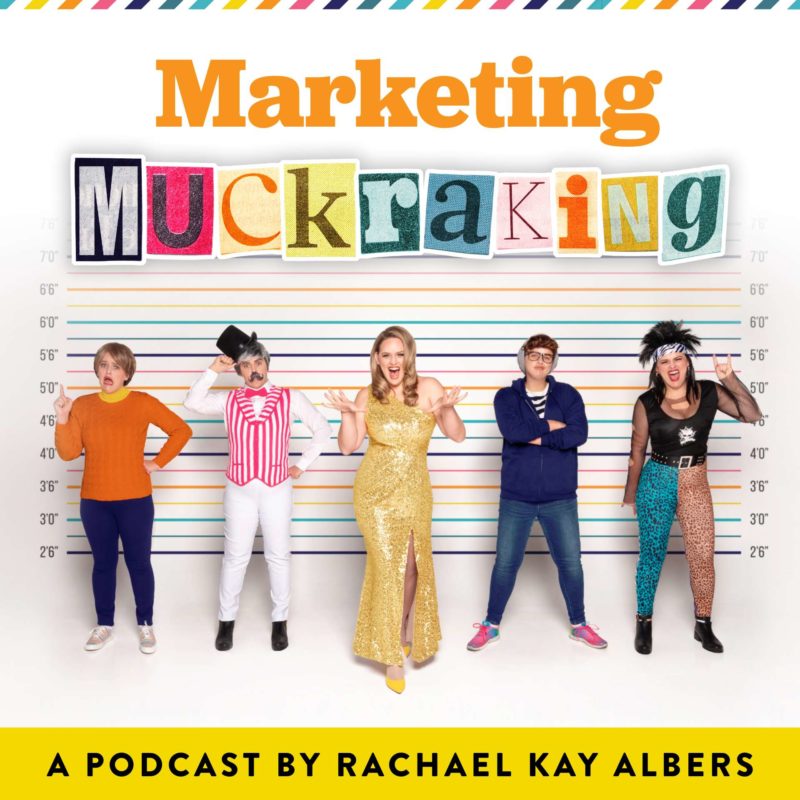
About the Marketing Muckraking podcast
Welcome to Marketing Muckraking, the show that asks not simply what brand culture can do for us, but what it’s doing to us — with your host, creative director, brand strategist gone wild, and the court jester of online business, Rachael Kay Albers — making fun of business and making business fun.
This is the show for rebels, revolutionaries, and renegades who run businesses that burn the rulebook. If you’re sick of business podcasts with all the answers — I’ve got nothing but questions.
Where we swap B School for FREE SCHOOL, easy for honest, and goal digging for marketing in pursuit of meaning.
If you love the show and want to support more marketing muckraking, please subscribe, review, share with your enemies, and if you really want to make my day, you can go to BuyMeARobe.com and leave a little something on the nightstand.

I have no freebie to tempt you with.
No automated email sequence to whisper sweet nothings into your inbox late at night.
Here’s what I do have: a hilarious show on how to market with integrity, sell your services & products successfully, and still not take yourself too seriously. Join me here:
